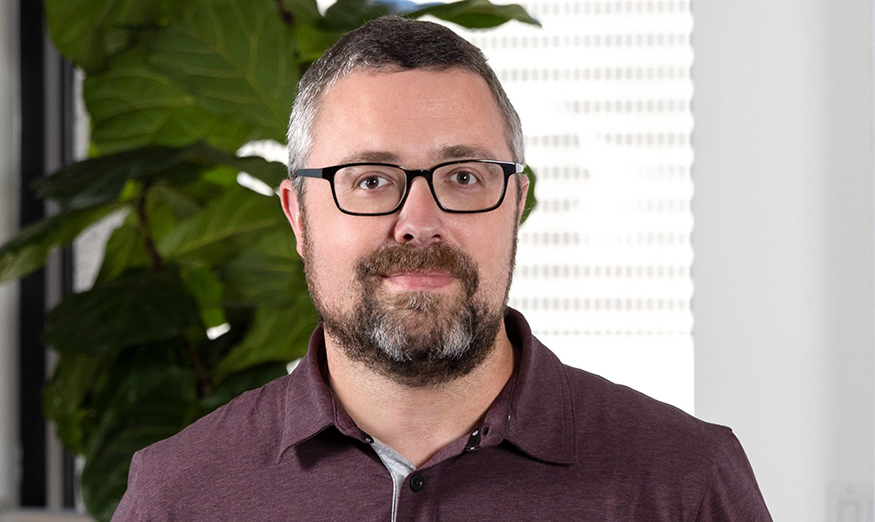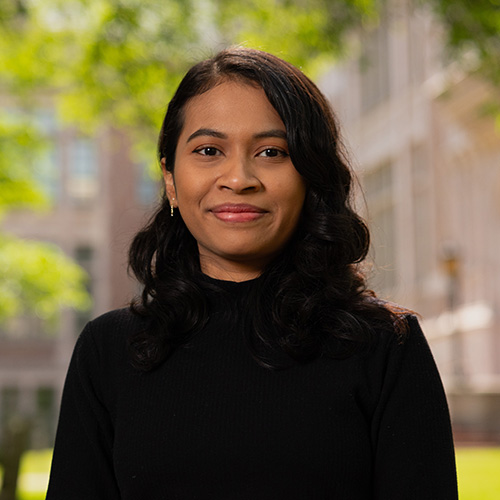
Trey Causey (MA, Sociology, 2009) is a matchmaker of sorts. At Indeed, a global job-matching and hiring platform, Causey helps connect employers with potential employees. Using artificial intelligence (AI), the company fields millions of requests each year from job seekers and employers.
As Indeed’s head of responsible AI and senior director of data science, Causey works to ensure that the company’s AI algorithms promote equity and fairness and prevent biases in hiring. It’s a challenging role that Causey spent years preparing for, including graduate studies at the University of Washington in the Department of Sociology and the Center for Statistics and the Social Sciences (CSSS), both in the College of Arts & Sciences.
“At Indeed, our mission is to help people get jobs, and that is actually a very sociological problem in a lot of ways,” Causey says. “My sociology background has definitely been helpful.”
Drawn to Data
Causey was intrigued by computers and data science long before they became popular career tracks. “I’ve always been a computer hobbyist,” he says. “Data science and machine learning were not very popular when I was growing up, but statistics really resonated with me, especially as I learned that it was the language of scientific inquiry in some ways.”

After earning an undergraduate degree at Virginia Tech, Causey chose the UW for graduate school, attracted in part by the quantitative focus of the Department of Sociology. At the time, natural language processing (NLP), which mines data encoded in language, was emerging as a new field. Causey was interested in how sociological questions might be explored through NLP.
For his doctoral research, Causey employed large-scale text analysis to study the rise of collective action in authoritarian countries. Using NLP, he analyzed coverage of the Arab Spring uprising in the Arab-language press, looking at how the protests were covered and how tightly the narrative was controlled by the press.
In preparation for this work, Causey studied Arabic at the UW and spent a summer at the University of Jordan in Aman through a Critical Language Scholarship. He also took courses in computational methods through CSSS, an interdisciplinary center that offers graduate courses in quantitative methods for social science students and supports collaborative research between social scientists and statisticians.
The Challenge of Responsible AI
While Causey pursued his doctoral research, the Great Recession decimated the job market for academics. At the same time, private-sector opportunities grew for people versed in computational methods. Causey decided to leave the UW in 2013 to pursue those opportunities rather than completing his dissertation. He has worked at startups large and small, in jobs at the intersection of statistics, data science, and machine learning. When he moved to Indeed, he found a particularly satisfying fit.
“The culture at Indeed is inquisitive, data-driven, and focused on getting job-seekers jobs,” Causey says. “350 million job seekers a month come to Indeed, so if you want to have an impact on the economy, on the world, it is a pretty significant place to do it.”
The biggest challenge is that AI systems are built off of data that humans produce, and humans are flawed, biased individuals.
Indeed’s AI uses natural language processing to help job seekers connect with employers based on information in their resumes and search queries. AI also creates summaries of job candidates for potential employers. Given the company’s dependence on AI, Causey’s role as head of responsible AI can impact the experience of millions.
Much of Causey’s work involves developing systems that mitigate bias, ensuring that every job seeker has a fair shot at finding meaningful work. “The biggest challenge is that AI systems are built off of data that humans produce, and humans are flawed, biased individuals,” says Causey. “When you think about that, it quickly gets into philosophical territory — do we want AI to just reproduce ourselves at scale or are we interested in producing a more fair and even-handed process?”
For Causey, the answer is clearly the latter. But prioritizing fairness is not straightforward. What may seem fair to one group may negatively impact another, and bias can be hard to recognize.
“We take into account as many voices as we can,” Causey says. “’Responsible’ AI means making sure you have a very diverse team in many different dimensions to be the voice of job seekers. It’s reading a lot of job-seeker feedback and looking at lots of data about different industries. It’s thinking about how to put the job seeker first, including those who may be returning to the workforce or are part of a marginalized group or have a disability. We think about the potential consequences of our products for all of those groups.”
Creative Sources for Social Data
Causey’s team includes data scientists, engineers, and other researchers. He credits his interdisciplinary courses in CSSS with preparing him to communicate effectively with people in different fields. In CSSS, faculty and students from various disciplines learn about statistical methods they can apply to their research. They often use different terminology in their work but find ways to connect.
“It’s a community,” Causey says of CSSS. “The common interest is methods, but the substantive research topics are quite diverse. Through CSSS I also learned how to pull information from other disciplines into my own work in creative ways. Some of the most interesting work happens when you take an insight from another discipline and apply it to your own field.”
Skills gained in the UW Department of Sociology also inform Causey’s current work. It’s where he learned how to come up with good research questions — questions with testable hypotheses that can be answered with data. It’s a skill he uses daily in his job.
“In sociology, oftentimes you have to get very creative in acquiring data,” he says. “You spend a lot of time thinking about how societal processes leave their mark on the world in data, and how to get and make inferences from that data. For example, to learn about job satisfaction, rather than just looking for survey data set that tells us if people like their jobs, we look at how long they stay in the job, or whether they recommend people for that job. Sociology has helped me think through all of those creative ways of using social data.”
Causey is committed to continuing to improve the experience of millions of job seekers and employers. It’s a heavy responsibility but one he welcomes.
“I feel good every day about what I do,” he says of his job. “I feel like I’m having a meaningful impact.”
More Stories

Balancing Sci-Fi and Scholarship
Speculative fiction author Anselma Prihandita (PhD, language and rhetoric, 2025), a Nebula Award winner, finds that her creative writing bolsters her scholarly work in unexpected ways.

Exploring the World — and Global Careers
Study abroad in Vietnam and Madrid. An internship with the State Department. International studies major Grace Kelly explored the world as a UW student.

Finding Focus Behind the Camera
When UW junior Audrey Spurgeon is at Husky athletic events, she's usually part of the broadcast team, thanks to an internship through the Big Ten Network's StudentU program.
